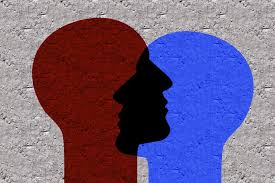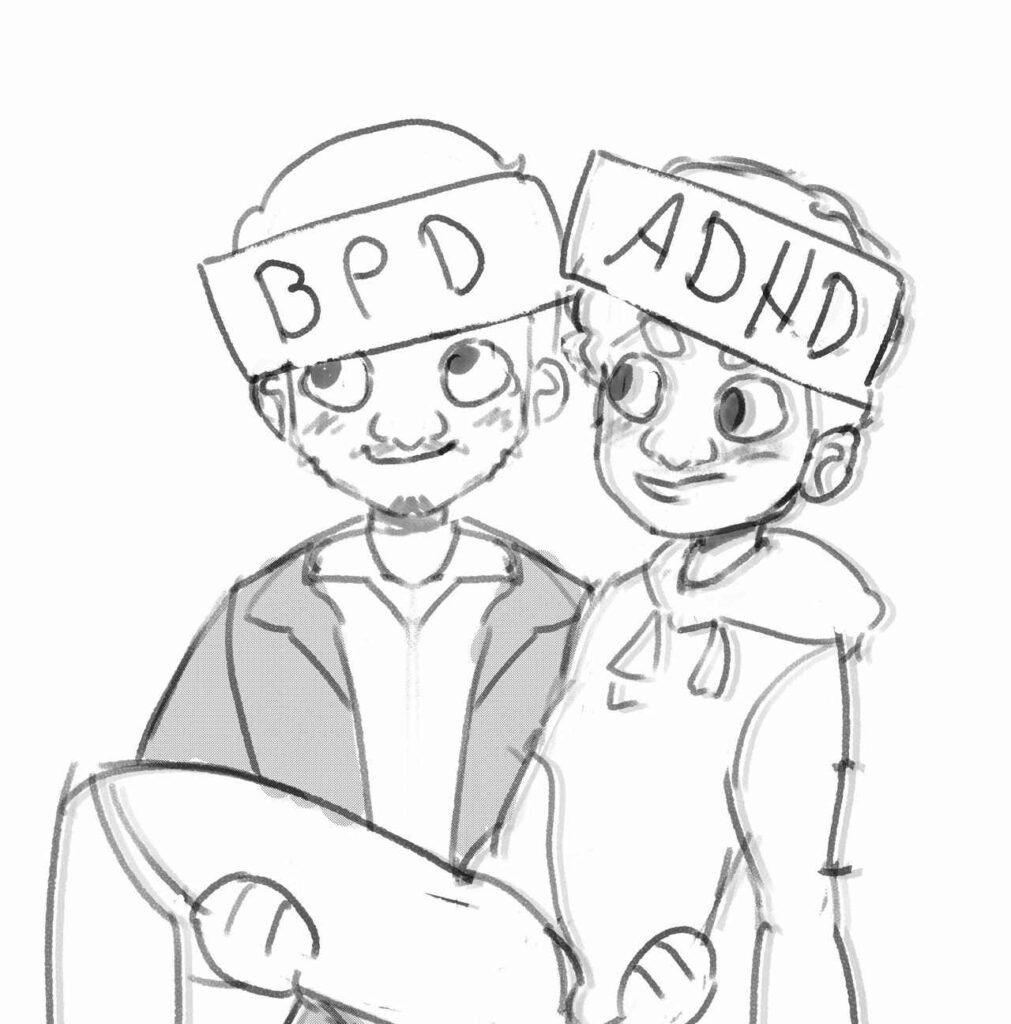If you or someone you know has been diagnosed with BPD or ADHD, it can be difficult to understand what that means and how to best deal with the condition. This blog post will provide an overview of both disorders, including symptoms and treatment options. We hope that this information will help you better understand these conditions and make decisions about how to best manage them.
Contents
Defining BPD And ADHD
 BPD and ADHD are defined as two distinct disorders in the Diagnostic and Statistical Manual of Mental Disorders, fifth edition (DSM-V). BPD refers to Borderline Personality Disorder, it is a personality disorder. It is characterized by impulsivity and instability in relationships, self-image, and emotions.
BPD and ADHD are defined as two distinct disorders in the Diagnostic and Statistical Manual of Mental Disorders, fifth edition (DSM-V). BPD refers to Borderline Personality Disorder, it is a personality disorder. It is characterized by impulsivity and instability in relationships, self-image, and emotions.
ADHD refers to Attention Deficit Hyperactivity Disorder, it is a neurodevelopmental disorder. And it is characterized by problems with focus, hyperactivity, and impulsiveness.
Both conditions are complex, and while they share some similarities, there are also important differences. It’s essential to understand both disorders to provide the best possible care for someone who lives with them.
It is necessary to understand BPD and ADHD to avoid misdiagnosis because they share some common symptoms. For example, both disorders can cause problems with impulsivity and emotional instability. Hence, a careful assessment is required to make an accurate diagnosis.
Symptoms Of BPD And ADHD
The symptoms of BPD and ADHD can be very similar, which can make it difficult to diagnose one from the other. However, some other symptoms are also common in both disorders.
BPD Signs
- Intense fear of abandonment
- Unstable or intense personal relationships
- Feelings of emptiness or boredom
- Explosive anger or frequent mood swings
- Self-image and low self-esteem issues
- Trust issues
- Paranoia or feeling unsafe
- Transient, stress-related paranoid ideation or severe dissociative symptoms
ADHD Signs
- Difficult in attention
- Organizational challenges
- Time management issues
- Procrastination
- Low frustration tolerance
- Excessive talking
- Interrupting others
- Fidgeting or squirming
Similar Symptoms
 There are some symptoms of BPD and ADHD that may seem similar at first glance. For instance, both disorders may involve:
There are some symptoms of BPD and ADHD that may seem similar at first glance. For instance, both disorders may involve:
- Trouble focusing
- Problems with impulsivity
- Acting on impulse without thinking things through
- Intense mood swings
These symptoms of both disorders can make it hard to focus on tasks, be productive, and maintain healthy relationships. Also, it is believed that BPD and ADHD are comorbid, meaning that having one disorder increases the risk of developing the other. So, this can make it difficult to accurately diagnose BPD or ADHD.
Thus, a professional diagnosis can be vital in getting the right treatment. Because the treatments for BPD and ADHD can differ, it’s important to get a professional opinion if you or a loved one are struggling with symptoms of either disorder.
Difference Between BPD And ADHD
 While people with BPD have a hard time with relationships, people with ADHD have a hard time focusing. It might seem like these two disorders would be nothing alike, but they actually share a lot of similarities.
While people with BPD have a hard time with relationships, people with ADHD have a hard time focusing. It might seem like these two disorders would be nothing alike, but they actually share a lot of similarities.
Here’s what you need to know about the difference between BPD and ADHD.
People with BPD are often seen as “drama queens” or “attention seekers”. Because they crave attention and approval from others. They may go to extremes to get the attention they need, such as engaging in risky behaviors or self-harming.
People with ADHD, on the other hand, are often seen as “space cadets” or “disorganized”. They may have a hard time paying attention or keeping track of things. Their impulsivity can also lead to risky behaviors, like driving too fast or spending too much money.
Moreover, the impulsiveness of people with ADHD can be mistaken for “drama”. And the inattention of people with BPD can be mistaken for disinterest. For example, a person with BPD may not return your calls because they’re afraid of rejection, not because they don’t care about you.
It’s important to remember that everyone is different. So, if you think you might have BPD or ADHD, it’s important to talk to a mental health professional. They can help you figure out if you have one of these disorders or both.
Treatment Options For BPD and ADHD
The treatment options for BPD and ADHD can vary depending on the severity of symptoms. And also treatment varies on how well the individual responds to treatment. Some of the common treatment options for both include:
Medication
There are also various types of medication that can be used to treat BPD and ADHD. The most common type of medication is stimulants. Stimulants help to improve focus and concentration. They can also help to reduce impulsive behavior.
Moreover, there are some other types of medication that can be used to treat BPD. These include:
- mood stabilizers,
- antipsychotics, and
- antidepressants.
Each type of medication has its own set of side effects. However, these medications are often very effective in treating the symptoms of BPD and ADHD. It is important to talk to a doctor before starting any type of medication. They will be able to determine which type of medication is right for you.
Psychotherapy
Psychotherapy is also known as talk therapy. It is a form of treatment that helps patients understand their disorder and develop coping mechanisms. The process of therapy can help patients with BPD and ADHD learn how to manage their symptoms. It includes various types of therapy, like:
- Cognitive Behavioral Therapy: CBT is a type of therapy that helps patients identify negative patterns of thought and behavior. It works to change these patterns to more positive ones.
- Dialectical Behavioral Therapy: DBT is a type of therapy that helps patients with BPD learn how to deal with their emotions. It also teaches them how to have healthy relationships.
- Interpersonal Psychotherapy: IPT is a type of therapy that helps patients with BPD understand and improve their relationships.
These types of therapy can be done in a group setting or one-on-one with a therapist. Therapy is often considered a long-term treatment option, as it can take months or even years to see results. But, it is really effective for many people with BPD and ADHD.
If you or someone you know has BPD or ADHD, it is important to seek professional help. There are many resources available to help people who suffer from these disorders.
Support Groups
 During BPD and ADHD, it is often helpful to join a support group. This can be an online or in-person group. In these groups, you can talk about your experiences and learn from others who understand what you are going through. You may also find helpful tips and resources.
During BPD and ADHD, it is often helpful to join a support group. This can be an online or in-person group. In these groups, you can talk about your experiences and learn from others who understand what you are going through. You may also find helpful tips and resources.
There are many online support groups for these conditions. Some are specific to BPD, while others are for both conditions. To find a group, you can search online or ask your doctor for recommendations.
In-person support groups may be harder to find. You can check with mental health organizations in your area or search online. You may also be able to find a group through your therapist or psychiatrist.
Self-Care Strategies
There are a few key things to remember when it comes to self-care if you have BPD and ADHD. These include:
Structure and routine
These two things are important for self-care. This means having a set time for meals, sleep, and activities. Also, routine is important as it can help to minimize impulsivity and chaotic behavior. Because when you are feeling good, it is easier to stick to a routine.
Support system
A support system can be incredibly helpful when managing BPD and ADHD. This could be friends, family, or a therapist. These people can offer help and understanding. They can also provide a much-needed distraction from negative thoughts and behaviors. In fact, being around others can be one of the most effective self-care strategies for these conditions.
Practice mindfulness
Mindfulness is a form of meditation that allows you to focus on the present moment. This can be helpful in managing BPD and ADHD as it can help to control impulsive thoughts and behaviors. It can also help to reduce stress and anxiety. There are many ways to practice mindfulness, such as through yoga, breathing exercises, and guided meditation.
Practice enough exercise
Exercise is not only good for your physical health, but it can also improve your mental health. It can help to reduce stress and anxiety, and it can also help to improve mood. It is important to find an exercise that you enjoy so that you are more likely to stick with it. Because staying active is an important part of self-care for BPD and ADHD.
Eat a healthy diet
A healthy diet is important for everyone, but it is especially important if you have BPD and ADHD. This is because these conditions can cause problems with appetite and weight. Eating a healthy diet can help to improve mood and energy levels. It can also help to reduce impulsivity and improve focus. Moreover, a healthy diet can help to reduce the symptoms of BPD and ADHD.
Find what works for you
 It is important to find self-care strategies that work for you. This may take some trial and error. But it is worth it to find what helps you feel better. Also, it is essential to remember that self-care is not a one-time thing. It is something that you need to do on a daily basis. So, find what works for you and make it part of your daily routine.
It is important to find self-care strategies that work for you. This may take some trial and error. But it is worth it to find what helps you feel better. Also, it is essential to remember that self-care is not a one-time thing. It is something that you need to do on a daily basis. So, find what works for you and make it part of your daily routine.
These are just a few self-care strategies that can be helpful if you have BPD and ADHD. Remember, it is important to find what works for you. And self-care is something that you need to do on a daily basis. So, make it part of your routine.
Conclusion
To conclude, individuals with BPD and ADHD often share certain symptoms, which can make diagnosis and treatment complicated. However, it is important to remember that each individual is unique and therefore requires a tailored approach to care. If you think you or someone you know may have these disorders, please reach out to a mental health professional for guidance.
For more information, please contact MantraCare. ADHD is a neurodevelopmental disorder characterized by difficulty in paying attention, hyperactivity, and impulsivity. If you have any queries regarding Online ADHD Counseling experienced therapists at MantraCare can help: Book a trial ADHD therapy session


